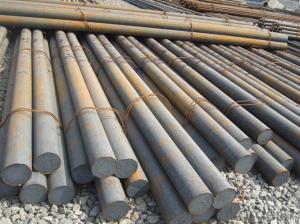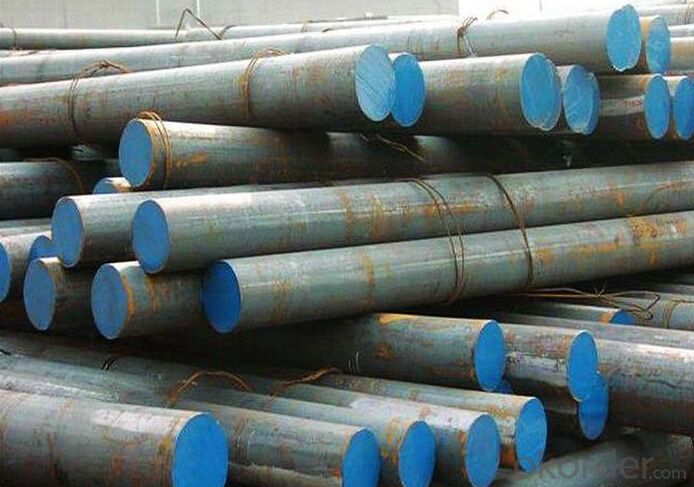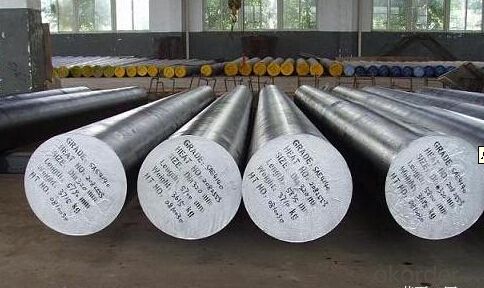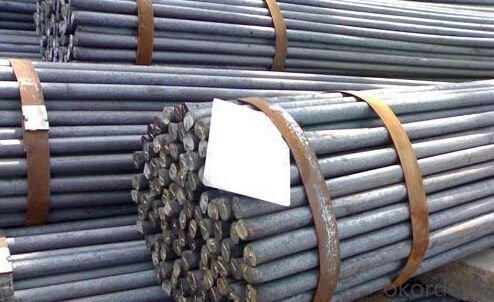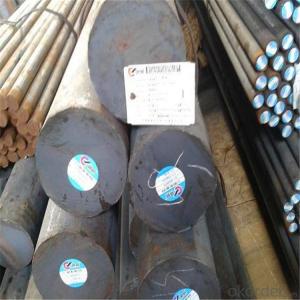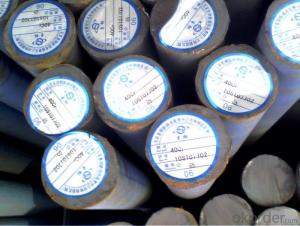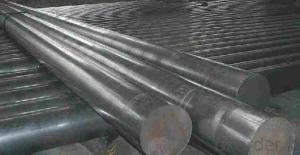20CrMnTi Alloy Steel Round Bar / 20CrMnTi Precision Round Steel Bar
- Loading Port:
- Qingdao
- Payment Terms:
- TT OR LC
- Min Order Qty:
- 5 m.t.
- Supply Capability:
- 100000 m.t./month
OKorder Service Pledge
Quality Product, Order Online Tracking, Timely Delivery
OKorder Financial Service
Credit Rating, Credit Services, Credit Purchasing
You Might Also Like
Specification
Type:
Carbon Steel,Spring Steel,Bearing Steel,Gear Steel,Deformed Steel,Stainless Steel,Alloy Steel
Shape:
Steel Coil,Steel Sheet,Steel Wire Rod,Steel Flat Bar,Steel Square Bar,Steel Angle,Steel Round Bar,Steel Billets
Technique:
Hot Rolled,Cold Rolled,Cold Drawn,ERW,Forged,Saw,Extruded,EFW,Spring
Surface Treatment:
Galvanized,Coated,Copper Coated,Color Coated,Oiled,Dry,Chromed Passivation,Polished,Bright,Black,PVDF Coated
Certification:
ISO,SGS,BV,IBR,RoHS,CE,API,BSI,UL
Thickness:
8-800mm
Width:
8-800mm
Length:
6-12
Outer Diameter:
8-800mm
Net Weight:
100
Packaging:
Seaworthy packaging
20CrMnTi Alloy Steel Round Bar / 20CrMnTi Precision Round Steel Bar
Detailed Information of 20CrMnTi Alloy Steel Round Bar / 20CrMnTi Precision Round Steel Bar
| Name | Steel Round Bar |
| Shape | Round Bar/Square Bar/Flat Bar/Plate/Wire |
| Standard | GB/ASTM/SAE/AISI/DIN/JIS/EN/BS |
| Surface Treatment: | Black/Peeling/Polished/Machined |
| Delivery Condition: | Hot Rolled or Forged/Peeled or Black Surface |
| Test | SGS/UT 100% Elements Testing |
| Certificate: | ISO/Mill Certificate |
| Service: | 24 hours online service / |
| more than 20 years trading and manufacture | |
| Quality Assurance: | the third party inspection, such as SGS, BV, TUV…etc. is acceptable |
| Packaging Details: | Seaworthy Packaging or as per customer's packing instruction |
Product Overviews of 20CrMnTi Alloy Steel Round Bar / 20CrMnTi Precision Round Steel Bar
| Product Name | Typical Grades | Diameter(mm) | Standard Adopted |
| Carbon Steel | 20 (1020/S20C/C22) | ||
| 40 (1040/S40C/C40) | Ø16-Ø300 | ||
| 45 (1045/S45C/C45) | |||
| Bearing Steel | GCr9 (51100/SUJ1) | ||
| GCr15 (52100/SUJ2/100Gr6) | Ø12-Ø250 | ||
| GCr9SiMn (A485-Gr.1/SUJ3) | GB/SAE/ | ||
| Cr-Mo Steel | 20Cr (5120/SCr420H/20Cr4) | JIS/DIN | |
| 40Cr (5140/SCr440/41Cr4) | Ø12-Ø250 | ||
| 42CrMo(4140/SCM440/42CrMo4) | |||
| Gear Steel | 20CrNiMo | ||
| 20CrMn(5115/SMnC420/20MnCr5) | Ø16-Ø600 | ||
| 20CrNiMo(8620/SNCM220/20CrMiMo2) |
Company Introduction of 20CrMnTi Alloy Steel Round Bar / 20CrMnTi Precision Round Steel Bar
CNBM International Corporation is the most import and export platform of CNBM group(China National Building Material Group Corporation) ,which is a state-owned enterprise, ranked in 270th of Fortune Global 500 in 2015.
With its advantages, CNBM International are mainly concentrate on Cement, Glass, Iron and Steel, Ceramics industries and devotes herself for supplying high quality series of refractories as well as technical consultancies and logistics solution.
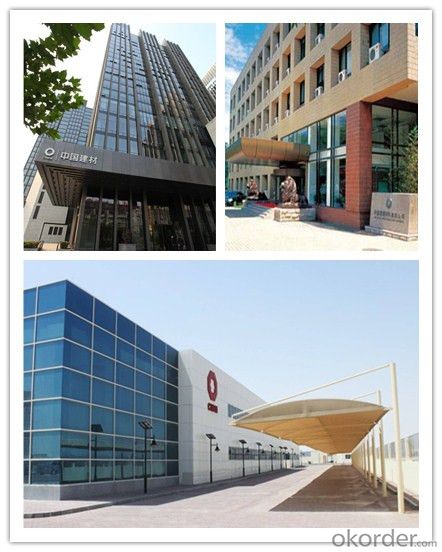
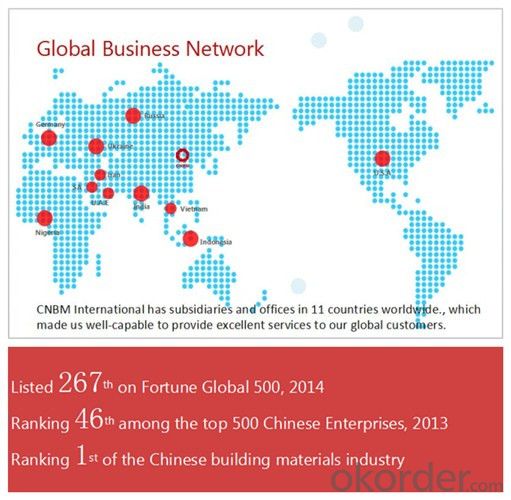
| After-sale service | l CNBM provides the services and support you need for every step of our cooperation. We’re the business partners you can trust; you can relax and get on with doing business. |
| l For any problem, please kindly contact us at any your convenient time, we’ll reply you in our first priority within 24 hours | |
| Advantages | l Industry experience over 20 years. |
| l Shipment of goods -More than 70 countries worldwide. | |
| l The most convenient transport and prompt delivery. | |
| l Competitive price with best service. | |
| l High technical production line with top quality products. | |
| l High reputation based on best quality products. | |
Packaging & Delivery of 20CrMnTi Alloy Steel Round Bar / 20CrMnTi Precision Round Steel Bar
| Packaging Detail | Sea worthy packing /as per customer's packing instruction |
| Delivery Detail | 15 ~ 40 days after receiving the deposit |
Products Show
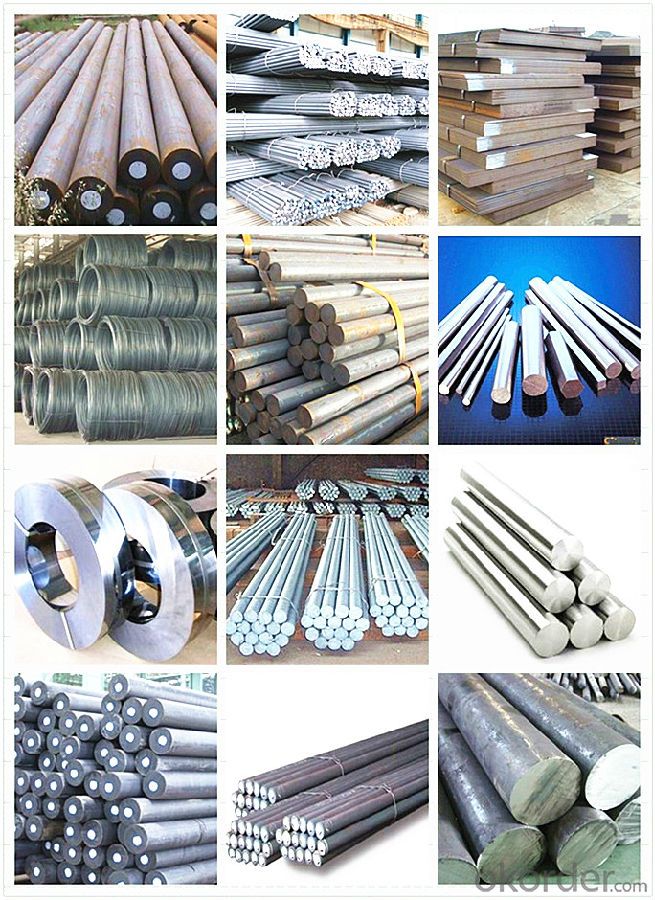
FAQ:
| Are you a trading company or manufacturer? | Manufacturer |
| What’s the MOQ? | 1000m2 |
| What’s your delivery time? | 15-20 days after downpayment received |
| Do you Accept OEM service? | Yes |
| what’s your delivery terms? | FOB/CFR/CIF |
| What's the Payment Terms? | 30% as deposit,70% before shipment by T/T |
| Western Union acceptable for small amount. | |
| L/C acceptable for large amount. | |
| Scrow ,Paybal,Alipay are also ok | |
| Why choose us? | Chose happens because of quality, then price, We can give you both. Additionally, we can also offer professional products inquiry, products knowledge train (for agents), smooth goods delivery, excellent customer solution proposals. |
| What's your available port of Shipment? | Main Port, China |
| What’s your featured services? | Our service formula: good quality+ good price+ good service=customer's trust |
| Where are your Market? | Covering more than 160 countries in the world |
- Q: How does special steel contribute to improving product safety in high-risk industries?
- Special steel plays a crucial role in improving product safety in high-risk industries due to its unique properties and characteristics. Its exceptional strength, durability, and resistance to corrosion make it highly reliable and less prone to failure under extreme conditions. By using special steel in the manufacturing of critical components and structures, such as in aerospace, automotive, and oil and gas industries, it ensures enhanced safety and prevents potential accidents or catastrophic failures. Additionally, the strict quality control and certifications associated with special steel guarantee that it meets the industry's stringent safety standards, providing peace of mind to both manufacturers and end-users.
- Q: How does special steel contribute to the weldability of products?
- Special steel can contribute to the weldability of products by offering enhanced mechanical properties, such as higher tensile strength and improved toughness. This allows for easier manipulation and deformation during the welding process, resulting in more efficient and reliable welds. Additionally, special steels often have controlled chemical compositions, which minimize the presence of impurities and unwanted elements that can negatively impact weld quality. Overall, the use of special steel in manufacturing promotes better weldability, ensuring stronger and more durable products.
- Q: Can special steel be used in the semiconductor industry?
- Yes, special steel can be used in the semiconductor industry. Special steel, such as stainless steel, is often used in the semiconductor industry due to its excellent corrosion resistance, high temperature resistance, and low contamination properties. It is commonly used in various components and equipment used for semiconductor fabrication and processing.
- Q: What are the different joining methods for special steel?
- There are several different joining methods for special steel, including welding, brazing, soldering, and mechanical fastening. Each method has its own advantages and considerations depending on the specific requirements of the application. Welding is commonly used for joining thick sections of steel and offers high strength and durability. Brazing and soldering involve melting a filler material to bond the steel pieces together at lower temperatures, making them suitable for joining thin or delicate components. Mechanical fastening methods, such as bolts, nuts, and rivets, provide a non-permanent joining solution and are often used in applications that require disassembly or reassembly.
- Q: What are the properties of free-cutting steel?
- Free-cutting steel is characterized by its high machinability, which means it can be easily and efficiently machined into various shapes and sizes. It has excellent chip breaking properties, resulting in reduced tool wear and improved surface finish during machining operations. Free-cutting steel also has good formability, allowing it to be easily shaped and fabricated. Additionally, it exhibits high strength and good corrosion resistance, making it suitable for a wide range of applications in industries such as automotive, aerospace, and machinery manufacturing.
- Q: How does special steel contribute to the defense machinery industry?
- The defense machinery industry heavily relies on special steel due to its numerous advantages and contributions to the performance and durability of various defense equipment. To begin with, special steel possesses remarkable strength and toughness, making it ideal for manufacturing crucial components like armor plates, ballistic missiles, submarines, and tanks. These components need to withstand impact, penetration, and extreme conditions, all of which special steel can handle. This ensures the safety and protection of military personnel and assets. Additionally, special steel offers excellent corrosion resistance, a crucial characteristic for defense machinery used in harsh environments such as maritime operations or combat zones. Corrosion can weaken structures and compromise equipment functionality, but special steel's resistance helps maintain the integrity and longevity of defense machinery. This reduces maintenance costs and increases operational readiness. Furthermore, special steel enables the production of precision components with high dimensional stability, essential for advanced defense systems like aircraft, missiles, and radars. These components require exceptional accuracy and reliability to function optimally, and special steel's uniformity and consistency meet these demands. This ensures precise performance and enhances the overall capabilities of defense machinery. Moreover, special steel also contributes to weight reduction in defense machinery. As military equipment becomes more complex and technologically advanced, reducing weight while maintaining strength is crucial for enhancing mobility, fuel efficiency, and overall operational effectiveness. Special steel's high strength-to-weight ratio allows for the development of lighter defense machinery without compromising durability or protection. In conclusion, special steel's exceptional strength, corrosion resistance, dimensional stability, and weight reduction properties make it an indispensable material in the defense machinery industry. It enables the production of robust and reliable equipment, ensuring the safety and effectiveness of military operations and enhancing the overall capabilities of defense forces.
- Q: How does the heat treatment process affect the properties of special steel?
- The heat treatment process has a significant impact on the properties of special steel. This process involves heating and cooling the steel in a controlled manner to alter its microstructure and, consequently, its mechanical properties. Firstly, heat treatment can enhance the hardness of special steel. By heating the steel to a specific temperature, followed by rapid cooling, a process known as quenching, the steel undergoes a phase transformation that increases its hardness. This is particularly beneficial for applications that require high strength and wear resistance, such as cutting tools or bearings. Additionally, heat treatment can improve the toughness of special steel. By tempering the quenched steel at a lower temperature, the brittleness caused by the rapid cooling can be reduced, leading to improved toughness and impact resistance. This is crucial for applications where the steel needs to withstand sudden shocks or impacts, such as in automotive or aerospace components. Moreover, heat treatment can also enhance the overall strength of special steel. Through a combination of heating, cooling, and tempering processes, the steel's grain structure can be refined, resulting in improved strength and resistance to deformation. This is particularly important for structural applications, where the steel needs to withstand heavy loads or extreme conditions. Furthermore, the heat treatment process can also influence the corrosion resistance of special steel. By subjecting the steel to specific heat treatment cycles, the formation of certain phases or chemical compounds can be promoted, leading to improved resistance against corrosion or oxidation. This is essential for applications exposed to harsh environments or corrosive substances, such as in marine or chemical industries. In conclusion, the heat treatment process plays a vital role in altering the properties of special steel. By carefully controlling the heating, cooling, and tempering cycles, the hardness, toughness, strength, and corrosion resistance of the steel can be significantly enhanced. This allows for the production of special steel with tailored properties to meet the specific requirements of various industrial applications.
- Q: What is the cost of special steel compared to other materials?
- The price of special steel can vary depending on various factors when compared to other materials. Special steel, also known as alloy steel or tool steel, is generally more expensive than regular carbon steel due to its superior properties and composition. Its strength, durability, and resistance to wear and corrosion make it ideal for specialized applications in industries like automotive, aerospace, and construction. In comparison to non-ferrous metals like aluminum or copper, special steel often has a lower cost. However, it is important to note that different types of special steel can have different price ranges. For example, stainless steel, which contains chromium and other elements for better corrosion resistance, tends to be pricier than carbon steel. When comparing the cost of special steel to materials like plastics or composites, it is crucial to assess the specific project requirements. While these alternatives may have lower initial costs, they may not possess the same level of strength, heat resistance, or durability as special steel. Therefore, the long-term benefits and savings offered by special steel, such as reduced maintenance, longer lifespan, and improved performance, should also be considered. Ultimately, the price of special steel compared to other materials is influenced by factors such as the type and grade of steel, market demand, quantity needed, and any additional processing or finishing required. Consulting with suppliers, considering the specific application requirements, and conducting a comprehensive cost-benefit analysis will help determine the most suitable and cost-effective material choice for a particular project.
- Q: What are the properties of duplex stainless steel?
- Duplex stainless steel possesses a combination of excellent mechanical properties, including high strength and corrosion resistance. It offers good toughness and ductility, making it suitable for a wide range of applications. Moreover, duplex stainless steel exhibits a higher resistance to stress corrosion cracking and pitting corrosion compared to other types of stainless steel. Additionally, it has a good weldability, enabling it to be easily fabricated and used in various industries such as oil and gas, chemical processing, and marine environments.
- Q: What are the applications of high-speed steel?
- High-speed steel (HSS) finds numerous applications due to its exceptional combination of hardness, toughness, and heat resistance. It is extensively used in cutting tools, such as drills, end mills, and lathe tools, enabling efficient machining of various materials, including metals, plastics, and wood. HSS is also employed in forming tools, such as taps and dies, where it can withstand the high pressures and temperatures involved in metalworking processes. Additionally, HSS is utilized in saw blades, milling cutters, and gear cutters, enhancing their durability and performance. Its versatility and reliability make high-speed steel a crucial material in various industries, including manufacturing, automotive, aerospace, and construction.
Send your message to us
20CrMnTi Alloy Steel Round Bar / 20CrMnTi Precision Round Steel Bar
- Loading Port:
- Qingdao
- Payment Terms:
- TT OR LC
- Min Order Qty:
- 5 m.t.
- Supply Capability:
- 100000 m.t./month
OKorder Service Pledge
Quality Product, Order Online Tracking, Timely Delivery
OKorder Financial Service
Credit Rating, Credit Services, Credit Purchasing
Similar products
Hot products
Hot Searches
Related keywords
